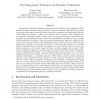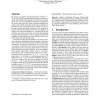21342 search results - page 4174 / 4269 » Structured language modeling |
137
click to vote
ASE
2005
15 years 2 months ago
2005
Techniques for efficiently evaluating future time Linear Temporal Logic (abbreviated LTL) formulae on finite execution traces are presented. While the standard models of LTL are i...
123
click to vote
JCP
2007
15 years 2 months ago
2007
— Currently, context awareness is one of the main trends in distributed mobile computing environments. Against this background, the demand for more complex – and additionally l...
132
click to vote
TOCS
2008
15 years 2 months ago
2008
We present an adaptive work-stealing thread scheduler, ASTEAL, for fork-join multithreaded jobs, like those written using the Cilk multithreaded language or the Hood work-stealing...
138
click to vote
UMUAI
2008
15 years 2 months ago
2008
We explored the reliability of detecting a learner's affect from conversational features extracted from interactions with AutoTutor, an intelligent tutoring system that helps...
167
click to vote
CI
2000
15 years 2 months ago
2000
Kowalski and Sergot's Event Calculus (EC) is a simple temporal formalism that, given a set of event occurrences, derives the maximal validity intervals (MVIs) over which prop...


